**Please note: this post contains language that may be triggering/offensive, including whorephobic speech, as it reports on comments made by anti sex work groups and their members**
Tonight, just one day after the Amnesty International resolution to develop a policy recommending the full decriminalisation of sex work, the School of Earth and Environment at the University of Western Australia (UWA) played host to a forum on regulating sex work.
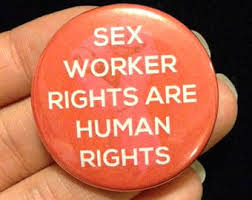
Speakers included:
In favour of full decriminalisation of sex work, local sex worker Rebecca Davies, member of People for Sex Worker Rights W.A. (local peer sex worker organisation) and Jane Green, Vice President of Scarlet Alliance (Australian Sex Workers Association).
With opposing views in favour of the Swedish (sometimes called Nordic) Model of sex work regulation, Peter Abetz (Liberal Member for South River in W.A.) and Simone Watson (Director of NorMAC, the Nordic Model in Australia Coalition).
Given the history of whorephobic activity and abusive behaviour at public events by anti sex work groups and their members in Australia, Rebecca and I were apprehensive but determined in defending sex worker rights in this setting. Also we were encouraged by the decision taken by Amnesty International yesterday.
However.
We were subject to the type of stigmatising speech sex workers who speak out about their rights are often subject to, such as:
“…legalising the right to sell her body…” Peter Abetz
“…at McDonalds you’re flipping the burgers, in prostitution you’re the meat…” Simone Watson
Audience members had to be removed for taking photos of speakers, despite clear advance notice before the event, written notice at the event and announcements before speakers began.
These are the tactics of stigma, intimidation and silencing used by anti sex work groups and their members.
We refuse to remain silent.
Our speeches are detailed below…
_____________________________________
My name is Jane Green and I am a current sex worker.
I am speaking today, as a sex worker and also on behalf of Scarlet Alliance, the Australian Sex Workers Association. We are a peer organisation, this means at every level – staff, volunteers, members and executive committee – we are all current or former sex workers. We do not allow owners or operators of sex industry businesses to hold membership in our organisation.
We are a sex worker organisation – and like other sex worker organisations we represent and are accountable to our community.
I do not speak for all sex workers, because no one can.
I speak from my own personal experience of sex work.
That may seem an unusual thing to say when I have just said that I am speaking on behalf of an organisation that represents sex workers across Australia, but let me explain – I am here to speak about facts. Because I believe in facts. I am here to speak about the evidence that sex worker organisations like the Scarlet Alliance here in Australia, but also sex worker organisations across the world have on sex work, on sex workers experiences – and that evidence reflects my own personal experience of sex work.
Scarlet Alliance, through its member organisations in Australia has the highest level of contact with sex workers of any organisation in Australia.
Sex worker organisations exist throughout the world. In some countries it is illegal to openly admit to being a sex worker or to have membership of a sex worker organisation.
Anti sex work groups regularly portray sex worker organisations as run by those in positions of privilege, or as “industry lobby groups”. This is a blatant lie designed to silence sex workers and their representative organisations. Instead of a standard power-point display I have chosen to run a display of images of sex workers and sex worker organisations from around the world protesting for the full decriminalisation of sex work – you will be able to see clearly that our community is diverse, yet united, in calling for sex workers’ rights to be recognised.
You may have noticed during this event that there are some differences in language being used, by the people to my LEFT.
As Rebecca has explained sex workers, generally prefer to be called sex workers. When our community, the representative organisations for our community – across the country and across the world, as well as the World Health Organisation and the United Nations all ask people to use the term sex worker you might not think that would be a lot to ask.
But it’s a different story when the people you are asking are specifically using language as a tactic to oppress you.
Sex work is work.
My work is real work.
& I have never had anyone adequately explain how having less rights would somehow “save me” or improve my situation.
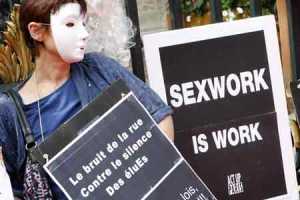
So what do we actually mean when we say that – that the Swedish (sometimes called the Nordic) Model would give us less rights?
When anti sex work groups talk about the Swedish Model “only criminalising clients ” what does that mean?
For a start it doesn’t just criminalise clients, it also criminalises all of the surrounding activities around sex work – Rebecca has outlined this.
But also, about “criminalising clients” under the Swedish Model, in reality exactly how does that work?
Do we imagine the police are just following random people around waiting for them to maybe decide to visit a sex worker?
Are there special psychic police that just know when someone might want to pay for sex?
New advanced technology like the Tom Cruise movie ‘Minority Report’ where police can anticipate what you are going to do in the future before you get there?
Surprisingly no.
Under the Swedish Model police actually target sex workers – the police follow, harass and stake out sex workers while trying to arrest clients.
This is what the “criminalisation of clients” looks like in reality.
This pushes sex workers underground, creates barriers to sex workers accessing peer support networks and health services, limits options when choosing clients and negotiating boundaries, increases risk, and makes it almost impossible to go to police if a sex worker is subjected to violence.
Also, so much of the rhetoric put out by anti sex work groups is centred around stigmatising sex workers and encouraging discrimination against my community.
I would like to point out that I am now going to read a quote, made in relation to the attack on Amnesty International’s support of the decriminalisation of sex work, but please clearly understand that these are the words of an anti sex work group (so I apologise for having to read them, and to those that may find them triggering and offensive):
“Shouldn’t Amnesty be focusing more on ensuring women have a real choice – that they have real agency – by addressing the underlying poverty, discrimination and lack of education that lead women into prostitution..”[1]
That was a short quote.
Let me explain why sex workers often seem so angry when dealing with anti sex work groups:
“ensuring women have a real choice”
Not all sex workers are women. Sex workers are people. This may mean women, INCLUDING trans women. This may mean men, INCLUDING trans men. But it also means people that identify across the gender spectrum. & I am not sorry that we do not fit into the box in which anti sex work groups seek to put us.
“ a real choice”
Thanks for deciding for me, that my choice is “not real”, when comparatively I guess everyone else’s is. Anti sex work groups often claim that any one that actually advocates for sex worker community can’t be representative OF sex worker community. I feel compelled to point out:
The individual sex workers and sex worker representatives that have been behind me throughout my speech on the PowerPoint display would like to illustrate that this is a deliberate attempt to mislead you and to silence our community.

“ensuring … that they have real agency”
Agency is your ability to act independently and make your own free choices. The structure of society around us (class, religion, gender, all of these things) influence us. They influence ALL of us.
Anti sex work groups sometimes focus on the idea that sex workers don’t have “free choice”.
WAKE UP and smell the capitalism!
We ALL live and work in a world where we all have to LIVE and WORK.
Unless you are part of a select minority born into wealth and privilege, yes, you will have to work.
People across the world experience relative degrees of privilege (for example white privilege) and are also impacted by the social environment in which they live and work.
But no worker is ever helped by having less options.
Attempting to criminalise sex work – any part of our work – is attempting to limit our options and in doing so makes our work unsafe.
To constrain us from making decisions about where, when and how we work – and most fundamentally whether we should be able to work at all is offensive.
Whatever “choices” we have – we have the right to make them. To suggest that we do not is fundamentally offensive.
“addressing the underlying poverty”
Poverty is a global, awful, complex issue – caused by rich countries, webs of influence, the IMF, bad government, charities that do not listen to the communities they serve (or even realise they serve those communities), a host of other factors, as well as social and personal indifference to other peoples suffering.
But poverty does not cause sex work – people living in poverty need to work and support themselves and their families – removing another option by which they can do so is not helping them. It is simply makes the lives of those engaging in sex work whilst living in poverty more dangerous.
“..lack of education..”
Okay, thanks for that – it’s nice to know what anti sex work groups think of us.
I’m not sure what level of education they consider appropriate for a particular workforce before intervention and saving is required, but maybe they could tell us? – perhaps a University degree?
The Australian Bureau of Statistics figures in 2007 indicate that 21% of people aged 25-64[2] in Australia had a Bachelor Degree or above, so by suggesting that “lack of education” (to some standard they have yet to define) is an issue, anti sex work groups may be insulting a larger proportion of the Australian workforce (76%) than they imagine.
& just how educated are Australian sex workers?
In a study conducted by the Queensland Government, also in 2007, 25% of sex workers surveyed had a university degree – so in Australia (or at least in Queensland) we’ve edged out in front slightly[3].
“discrimination”
Sex workers are currently discriminated against in a multitude of ways on a daily basis across Australia.
I would like to give you a list of examples that I keep when I advocate for sex work community – but when I timed my speech including the list it put me three minutes over time.
After this event my speech will be posted online and includes the list of discrimination that sex workers face in Australia, that is NOT a complete list, but illustrative – I would encourage you to access this, as often the concept of discrimination is an intangible concept, invisible if you are not a part of our community.
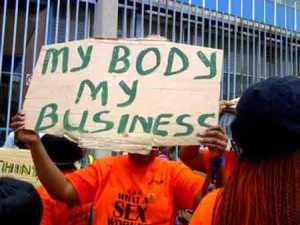
This is a list of examples of the types of discrimination sex workers in Australia face, that had to be omitted from the speech at the W.A. Forum on Regulating Sex Work, Wednesday the 12th of August, due to the length of time it would have taken to include it into the event.
Please be aware this list is not extensive, also:
a) it is illustrative of the discrimination that sex workers in Australia face, used as examples when advocating for sex worker community (& sometimes when doing sex worker advocates only have short windows of time in which to advocate),
b) many sex workers experience intersecting marginalisation (for example: sex workers of colour and trans sex workers)
c) the last point is (in my opinion) the most important point
- Sex workers experience stigma and discrimination through ‘outing’, being exposed as a sex worker, this can impact on workers but also on families, partner/s and friends
- It can affect school age and/or older children if a parent or carer is who is a sex worker is ‘outed
- Sex workers may experience interpersonal and/or interfamilial violence when ‘outed’
- Being a sex worker may affect the outcome of child custody cases
- Sex worker status may affect access to housing and accommodation
- Sex worker status affects employment disputes & future employment opportunities
- Being out or being ‘outed’ as a sex worker leads to discrimination regarding health insurance
- The ‘Leaking’ and misuse of personal information on sex workers can lead to stalking, blackmail & extortion
- There are less opportunities for sex workers to utilise remedies to address discrimination
- Sex workers are discriminated against regarding goods and services (including banking and online commerce)
- Sex workers have been barred entry to clubs or hotels
- There is discrimination in education against sex workers (including the exclusion of sex workers from University Courses on ‘morals clauses’)
- Sex workers are discriminated against regularly in medical settings (for example refusal and/or exclusion from treatment ‘on conscience’)
- Sex workers have been discriminated against in membership of trade unions
- Sex workers experience the implication of ‘criminality’ that is implied by registration under licensing regimes
- Sex workers have less ability to access police/justice under criminalised and licensing systems.
- There is reduced access to health/outreach services for sex workers under criminalisation/licensing systems for regulating sex work
- Sex workers experience increased stigma and discrimination in media
- Police attitudes to sex workers, including corruption and harassment from criminalisation, or entrenched stigma/discrimination from prior criminalisation – affect sex workers ability to access police and their treatment when sex workers do.
- Sex workers are subject to stalking and harassment from anti sex work groups and their members, including outing to family and in social media
- Lastly, sex workers are often NOT HEARD – OUR VOICES, SEX WORKERS VOICES are always the most critical voices in ANY discussion about OUR lives and OUR work.
If there is a discussion on sex work happening in Australia, in government, on policy, in media, on our LIVES – if sex workers are not INCLUDED, if our representative organisations are not there – then be aware a choice has been made to deliberately exclude us.
And if anti sex work groups attempt to remove sex workers from discussions about our lives and work, we are not required to sit down, shut up, behave politely and wait for them to stop trying to ‘rescue us’.
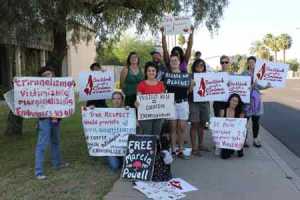
We’ve been ‘rescuing’ ourselves for years. We call it – sex worker activism.
Equality for sex workers is a future that sex workers are creating every day, through the action and voices of our community and our own sex worker organisations. This future can be achieved more easily with allies by our sides, making space for sex worker voices to be heard and supporting our activism. It is not aided by anti sex work groups that do not recognise our voices, rarely if ever talk to us, but frequently talk about us – who refer to us as objects: as “bodies”, say that we are “bought” and “sold”, who call us “product”.
I do not “sell my body”. My body is still here. I sell a service.
Suggestions from anti sex work groups and the ‘rescue industry’ that sex workers need others to speak on our behalf, that we are not the experts on our own lives and work – that is silencing our community, that IS exploitation of sex workers.
I cannot expect anti sex work groups to stop working against us.
But I ask you to START WORKING WITH US:
– become a sex worker ALLY
– START speaking up in support of sex workers
– DO NOT BE QUIET when people use hate speech to define us, calling us epithets rather than calling us SEX WORKERS, objectifying us and demeaning us rather than calling our work, just that – SEX WORK
Nothing about us, should ever be without us.
[1] ‘Amnesty International – The Sex Trades New Best Friend’, Tasmanian Times, http://tasmaniantimes.com/index.php?/pr-article/amnesty-international-the-sex-trades-new-best-friend/, Simone Watson, 13-Jul-15.
[2] Refer Australian Bureau of Statistics – http://www.abs.gov.au/ausstats/[email protected]/mediareleasesbyTopic/CAB937E9717F783BCA2568A900136267?OpenDocument
[3] “In terms of education, about one-quarter of licensed brothel workers and sole operators reported that they had completed a bachelor degree. This compares favourably with the general community. According to an Australian Bureau of Statistics publication, Education and Work, May 2007, 21% of Australians aged between 15 and 64 years had attained a bachelor degree or above..”, Select Sex Industry Statistics, Prostitution Licensing Authority, Queensland Government.
_____________________________________
My name is Rebecca Davies, I am a Western Australian sex worker and a member of People for Sex Worker Rights in W.A., a peer sex worker group that aims to have our work decriminalized and remove the social stigma sex workers face. Our decision making committee is made up of current sex workers only.
In researching my opponent tonight, I have come to a simple conclusion, Peter Abetz is misguided in his attempts to “help” women. Sticking with his Christian background Peter believes that the government and more importantly men, have a role in regulating women’s bodies. This is evident to me with Peter’s long campaigning for more restrictive abortion laws, saying things such as:
“..the silly thing is if a child is injured in an accident, it can claim damages but if a mother says it’s inconvenient and has the baby killed, the law says that’s perfectly okay..”
in the West Australian, and his persistent attempts to undermine sex workers health and safety by campaigning for the Swedish (sometimes called Nordic) model at every opportunity.
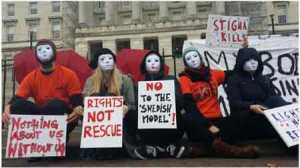
I have been a sex worker for over ten years. I have worked within various legal frameworks in my time, and I have also seen the difference between laws, intentions, and how things are actually implemented on the ground. I have worked with other sex workers doing sex work, and I have also previously worked as a peer educator providing outreach services and health promotion to sex workers across W.A., in sex industry venues, private workplaces and on the street in street based sex work areas.
At this point I would like to give some background on Western Australia. Up until 2000 sex work here was illegal. Keeping a brothel, soliciting etc. way back when, even the police knew this would not work, and the W.A. police, understanding even then, that they could not eradicate the sex industry, implemented what was commonly known as “the containment policy”. This policy, which was not law, but rather police policy, started in Kalgoorlie, in the famous (or infamous) Hay Street area red light district. Under the policy police allowed certain premises to operate only in certain areas of town. The police had to know who was working where. The policy was eventually implemented across the state and certain venues were allowed to operate, workers had to be registered with vice. I began working after the law change, although some workers were not aware of the change, and police continued to collect information. Police have never given clear answers about where this information is kept, for what purpose it is kept and who has access to it.
Often groups advocating the Swedish Model do not seem to understand that just like full criminalization and licencing, it still positions police as the regulators of the industry. The police cannot be of full assistance to sex workers whilst they are continually cast in this regulatory role, which they are not given in any other industry. How can we seek assistance if we experience violence, if we are either subject to penalties ourselves, or under the Swedish model, where we would be lining ourselves up for police surveillance whilst simultaneously cutting off our own income? Somehow I don’t see myself reporting under those circumstances. I think it is also really important to point out research conducted by Elaine Dowd in 2003, titled “Sex workers rights, human rights the impact of Western Australian legislation on street based sex workers. Dowd cites research from SARC, the sexual assault resource center, which found of sex workers reporting sexual assaults in Perth, over 50% were perpetrated by police.
Also problematic is the reference within the Swedish Model to literally almost anyone as a pimp. Landlords can be charged with pimping if they don’t evict sex worker tenants. There was even a case of a sex workers adult child charged with pimping because his mother didn’t charge him rent. Another case that particularly resonated with me is that of Petite Jasmine. Because of her status as a sex worker her children were removed from her custody and given to her violent ex-partner. He subsequently stabbed her to death. I don’t understand how people can say this is a step towards equality, when a women can have her children removed and a violent man is deemed a more suitable parent because someone doesn’t agree with how she makes a living. As a sole parent and a sex worker this is one of my biggest fears, to have my child removed because you don’t like my job.
Often when discussing sex worker rights things can become really heated. For us, this is because it is our lives and livelihoods are on the line and at the end of the day, a simple truth remains, changing the law does not actually affect politicians, or even former sex workers, it affects those of us currently working in the industry today. I think the Swedish Model can be summed up by Ann Martin, Sweden’s trafficking unit head who said:
“..of course the law has negative consequences for women in prostitution but that’s also some of the effect that we want to achieve with the law..”
I am tired of not having full access to my human rights. People don’t seem to want to listen to sex workers, often statistics are thrown around by academic types such as “..95% of women in prostitution don’t want to be there..” and “..most start in the industry at 13..” amongst other hysterical claims. When you do a bit of digging you will find that they are in fact all referencing the same material, research conducted by Melissa Farley, an anti-sex work campaigner. Since people don’t pay much attention to sex workers discrediting Dr Farley, I find it much easier to quote one of those academic types that people take seriously, Justice Susan Himel, who was the presiding judge in Canada’s supreme court during Bedford v Canada, in which Canada’s anti-sex work laws were struck down. Justice Himel said of Dr Farley’s research:
“Although Dr. Farley has conducted a great deal of research on prostitution, her advocacy appears to have permeated her opinions. For example, Dr. Farley’s unqualified assertion in her affidavit that prostitution is inherently violent appears to contradict her own findings that prostitutes who work from indoor locations generally experience less violence. Furthermore, in her affidavit, she failed to qualify her opinion regarding the causal relationship between post- traumatic stress disorder and prostitution, namely, that it could be caused by events unrelated to prostitution.
Dr. Farley’s choice of language is at times inflammatory and detracts from her conclusions. For example, comments such as “prostitution is to the community what incest is to the family” and “just as pedophiles justify sexual assault of children . . . . Men who use prostitutes develop elaborate cognitive schemes to justify purchase and use of women” make her opinions less persuasive.
Dr. Farley stated during cross-examination that some of her opinions on prostitution were formed prior to her research, including “that prostitution is a terrible harm to women, that prostitution is abusive in its very nature, and that prostitution amounts to men paying a woman for the right to rape her”.
On this basis Judge Himel eliminated Canada’s anti-sex work laws, deeming them unconstitutional.
And furthermore, in the words of Dr Melissa Farley’s own research assistant on her research in New Zealand where she attempts to discredit decriminalization, in 2003 Colleen Winn said the study:
“..was not ethical, and the impact has done harm to those women and men who took part in it. It is for that reason that I am writing to the psychologists’ board of registration in California to lay a formal complaint regarding Melissa. I also believe that Melissa has committed an act of intentional misrepresentation of fact”

I’m not here today to ask you to be pro sex work, and I’m also not asking for anything special, I just want my work to be decriminalized so I can be treated like everyone else. I want to be able concentrate on my safety at work rather than police evasion tactics. My colleagues and I don’t want to be rescued, we just want to live and work in peace.
_____________________________________
You can read the live tweeting of the event at: #SexWorkWA
For more information on joining Western Australian sex workers in campaigning for the full decriminalisation of sex work:
Visit the website of People for Sex Worker Rights W.A.
Or join People for Sex Worker Rights W.A. on twitter at – @sexworkrightswa
For more information on joining sex workers nationally in Australia campaigning for their human rights and labour rights:
Visit the website of Scarlet Alliance (Australian Sex Workers Association)
Or join Scarlet Alliance on twitter at – @scarletalliance
Horrendous how anti sex work groups seek to stigmatise, harass, misrepresent, dehumanise and lie to destroy sex worker’s lives for their own vain glorious ego trips and financial gain. They are worse than any supposed imaginary “pimp!”
Reblogged this on Pycraftsworld’s Weblog.
Pingback: The Sound of Silencing Sex Workers | sexliesducttape
Pingback: The “best of times” & the “worst of times” (SlutWalk 2015) | sexliesducttape
Pingback: Forum on Regulating Sex Work in Western Australia | People for Sex Worker Rights in WA